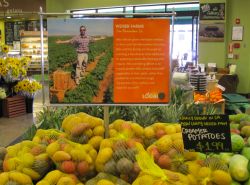I think that one, living in California, and two, living on a ranch, is causing me to obsess about food. Or maybe it is because publishers keep sending me books about food to review (come back next week for one of those very reviews). Regardless of the reason, I was in Whole Foods last week and the last few times I was there, I noticed that they are labeling all of their fruit and  produce by country, and sometimes, city of origin (also known as food labeling a separate topic for discussion). The idea is to support local farmers first, and then to support American farmers second.
produce by country, and sometimes, city of origin (also known as food labeling a separate topic for discussion). The idea is to support local farmers first, and then to support American farmers second.
There are several driving factors for this change at Whole Foods one of which is that many people believe that as much as possible, they should eat local food. While the definition of local food varies, basically it is food that was produced within 250 miles of where you live. Second, people believe our food supply is not safe and knowing the country of origin of spinach will give them some sort of piece of mind, i.e. American food is safer.
Oftentimes, these same people are promoting that the local food movement will feed the world (and save Africa, yet another discussion you can read about here) but there are some serious problems with this way of thinking. Many people in our country do not live in areas that can even begin to produce food within 250 miles….Arizona, New Mexico, Nevada are just three states that could never produce enough food to feed their populations because they don’t have enough water and they would have to put land into production.
People are criticizing agriculture for the amount of land they use when in reality, farmers are producing MORE each year using LESS land. Hey enviros – are you prepared to put millions of acres of land back into production to ensure your local food supply?
 People are also criticizing agriculture for the amount of irrigation needed to grow your food. Do you realize that the local food you eat is irrigated? No food grows without water. That being said, there are companies dedicated to creating hybrids that require less water but still have high yields. There I go again, it’s that less is more thing ag’s got going on.
People are also criticizing agriculture for the amount of irrigation needed to grow your food. Do you realize that the local food you eat is irrigated? No food grows without water. That being said, there are companies dedicated to creating hybrids that require less water but still have high yields. There I go again, it’s that less is more thing ag’s got going on.
Don’t get me wrong, I say this all the time and will continue to say it, I’m all for local food production and the support of small, family owned farms – I live on one. But we can not feed the world with local food production. However, production farmers can and will feed the world in a sustainable manner all while producing more from less. Now that’s something we need to get behind.
